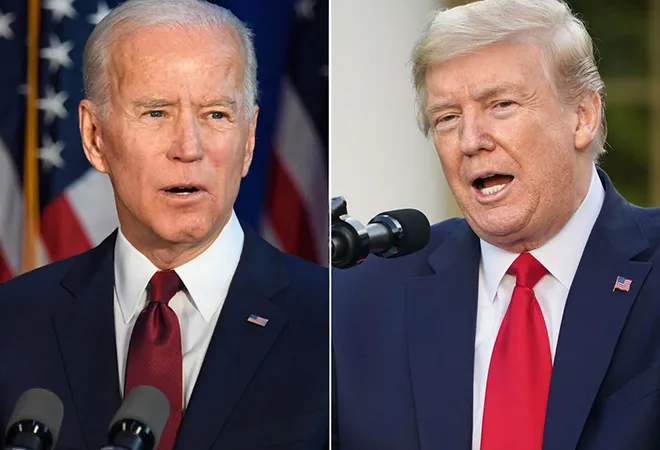As the US reaches the last phase of its presidential election campaign, it may be time to reflect what an American approach to the world without Trump may be like, and what it would be, were he to return.
His departure would remove the sharper edges of Trumpism, but they will not be gone. Because Trump represents a strong political trend in the US which feels that global commitments have impoverished the US and that the world has, somehow, exploited American generosity. The policy towards China, for example, has now developed a bipartisan edge and, in fact, minus Trump it may even become more effective, given his penchant for personalised decision-making, as evident in the case of the reprieve he gave ZTE in 2018, or the handling of TikTok this year.
The world Trump or Biden would face in 2021 would be one shaken up by the Covid experience. The old verities about ‘American leadership’ would have been proved wrong.
Given Covid, it is easy to forget that Trump had just struck a huge trade deal with China in January, one that would have sharply enhanced the US-China engagement had it run its course. Instead, Trump has veered off and now leads a campaign to isolate and humble China. The only explanation for this radical change is that he needed to attack China to cover up his own monumental failure to control the outbreak.
Speaking at the virtual UN General Assembly session last week, Trump’s message outlined his perspective. Where the UN embodied the notions of world government, and required nations to shed some of their sovereignty for the common interest, Trump declared, ‘We reject the ideology of globalism and accept the doctrine of patriotism.’ His unabashed assertion of sovereignty goes against the very charter of the United Nations. A second Trump term would most certainly mean the end of the world order as we have known it till now. The US has already pulled out of the WHO and the chances are that it could also do so from other bodies like the WTO and, perhaps, even the UN itself.
More than anything, the Trump administration’s handling of the pandemic has bewildered the world. Instead of assuming the leadership of what is clearly a global challenge, the US retreated into itself. With its huge scientific and monetary resources, it is likely to come up with a vaccine against the virus sooner than later. But Trump’s Operation Warp Speed to hasten the development of a vaccine, funded by billions of dollars, has been aimed at the US electorate, rather than the world community.
The US has bluntly declared that it will not join the Covid-19 Vaccines Global Access (COVAX) facility, a global effort by 170 countries to develop, manufacture and equitably distribute a vaccine. The main reason is that COVAX is aimed at ensuring that the poor and backward countries do not get left out of the vaccine distribution. It does not sit well with the ‘America First’ trope of the Trump administration since the US believes that it will ‘win’ the vaccine race and make decisions based on its own national interest.
Meanwhile, the world will not stand still. Like it or not, China would still be around, perhaps more resilient and self-contained, but an equally daunting but different kind of challenge to the world order. With Trump, there would be no certainty of a coherent response. This would encourage countries to sit on the fence for fear of alienating either power.
On the other hand, a Biden administration would strengthen ties with Japan, South Korea and Europe, and this could yield a coordinated and possibly more effective policy towards China and Russia, one that would not necessarily be a zero-sum game. But no one would be able to turn the clock back, either on China, or with regard to America’s sceptical allies and friends.
In some ways, the Trump administration’s America First notion is only a more extreme manifestation of the mainstream US foreign policy which has never quite gotten used to working with partners, and is more comfortable with allies who know their place in the system. The US policy till now has not been very different from that of China, which openly advocates differing perspectives towards the small and weak and the rich and powerful.
But the world Trump or Biden would face in 2021 would be one which has been thoroughly shaken up by the Covid experience. All the old verities about ‘American leadership’ would have been proved wrong. The US will be as much shaping, as being shaped by what is happening around the world. It will be a world where neither the US nor China can set the terms. The Americans, whether under Trump or Biden, would need to have a much humbler approach to the world than they have had till now.
External Affairs Minister S Jaishankar, a votary of close ties with the US, has taken great care in recent months to nuance the contours of India’s foreign policy. In his speeches and in his recent book, he has asserted that India will not be part of any alliance system, presumably one led by the US.
Instead, he has been advocating a multipolar approach which involves building coalitions with ‘middle powers’ like Japan, Australia and the EU. In July, addressing the US India Business Council’s Ideas summit, Jaishankar noted that ‘the US really has to learn to work… with a more multipolar world, with more plurilateral arrangements, go beyond alliances with which really it has grown up over the last two generations’.
This commentary originally appeared in The Tribune
The views expressed above belong to the author(s). ORF research and analyses now available on Telegram! Click here to access our curated content — blogs, longforms and interviews.

